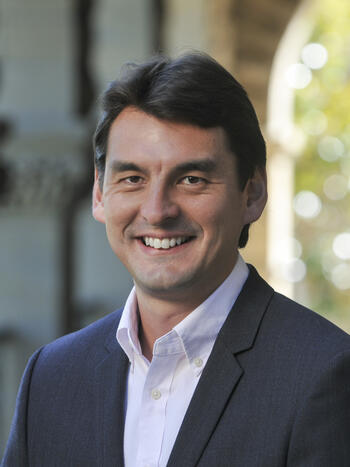We have reached venue capacity. RSVPs are no longer being accepted.
In China, Japan, and Korea, large companies have historically played predominant roles in their economies. However, with startups often driving disruptive innovation in the current digital global era, the question is how incumbent large firms can adapt, adjust, and harness the power of small firms while making use of their existing resources. This panel brings together perspectives from China, Japan and Korea.
In China, we have seen the explosive growth of information technology firms such as Alibaba and Tencent, who are now at the technological forefront of several areas such as using data and artificial intelligence for financial tech (Fintech) offerings. What are the key features of China's entrepreneurship ecosystem and how do large firms work with new firms?
In Japan, a major challenge is how to unleash potential innovations currently held by large companies who are unable to capitalize on them. World Innovation Lab (WiL) is a Palo Alto and Tokyo based company structured as an investment fund, designed to assist large Japanese companies carve out potential intellectual property into startups, and to harness Silicon Valley startups through investments and partnerships. ANA is a large Japanese airline company that has partnered with WiL to find new strategies for driving its next wave of innovations.
South Korea is home to some of the most competitive firms in the high tech areas, and the question is to how to remain at the forefront of high value added activities in rapidly commoditizing offerings. Samsung Research America is focused on harnessing Silicon Valley through development of software, user experience, and services for the next generation of products.
Panelists:
Tao Li Founder and Executive Director, APUS Group
Li is widely believed as an innovative visionary and highly strategic entrepreneur. Before founding APUS Group, Li served as senior Vice President of Qihoo 360 (QIHU NYSE), a major internet company player known for its antivirus software. Prior to that, Li has involved with several well-known companies like Datang Telcom, 3721. He is an internet expert with expert internet knowledge, distribution channels and marketing experience. Mr. Li is an active venture capitalist that has invested in dynamic startup companies from media and VR technology to video advertising companies, both domestically and abroad. Li received a Bachelor of Engineering degree from Zhengzhou University in 1998. Currently Li is a Finance EMBA student in Tsinghua University.
Aki Koto, Partner, World Innovation Lab (WiL)
Mr. Koto enjoys working with visionary entrepreneurs in frontier tech such as VR/AR, Bitcoin, IoT, and Autonomous Driving as the investment partner. He is also passionate about WiL’s corporate innovation efforts to bring WiL’s corporate partners’ organizational and corporate cultures more in line with Silicon Valley’s ethos. Through his facilitation of the Design Thinking Workshops and mentorship of the workshop facilitators, he has deepened his relationships with corporate executives which are influential in opening up business development opportunities between corporations and startup companies.
Hideaki Matsumoto, Manager, Digital Design Lab, All Nippon Airways (ANA)
Mr. Matsumoto is in charge of researching and creating new business, service, and process innovation models. Currently, he is investigating new business paradigms in the areas of education and sports that fully leverage ANA's brand, assets, and strengths. He is actively researching startups and cutting-edge technology related to these two fields both in Japan and around the world. Prior to ANA, he worked in the R&D Center at Canon and was responsible for developing new recognition technologies like OCR, form recognition and face recognition. He holds both a BS and MS from Kyushu University.
Pranav Mistry, Head of Think Tank Team and Senior Vice President, Samsung Research America
Pranav Mistry is a computer scientist and inventor. He is currently Head of Think Tank Team at Samsung Research America and is best known for his work on SixthSense, Samsung Galaxy Gear and Project Beyond. His research interests include Wearable Computing, Augmented reality, Ubiquitous computing, Gestural interaction, AI, Machine vision, Collective intelligence and Robotics. The World Economic Forum honored Mistry as one of the Young Global Leader in 2013. Prior to his current position, he has worked with Microsoft, Google, CMU, NASA, UNESCO and Japan Science & Technology, to name a few. Pranav was a PhD candidate at the MIT Media Lab and earned his MA in Media Arts and Sciences from MIT, MDES from IIT, Bombay and a BS in Computer Science and Engineering.
Kenji Kushida, Research Scholar, Japan Program, Shorenstein APARC, Stanford University (Moderator)
Kushida’s research interests are in the fields of comparative politics, political economy, and information technology. He has four streams of academic research and publication: political economy issues surrounding information technology such as Cloud Computing; institutional and governance structures of Japan’s Fukushima nuclear disaster; political strategies of foreign multinational corporations in Japan; and Japan’s political economic transformation since the 1990s.







